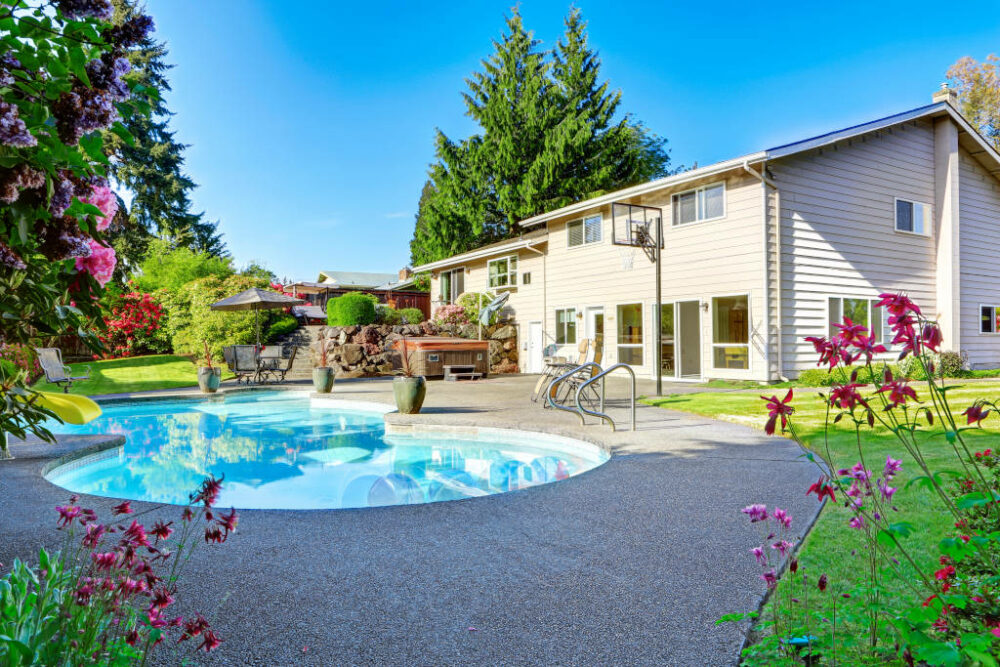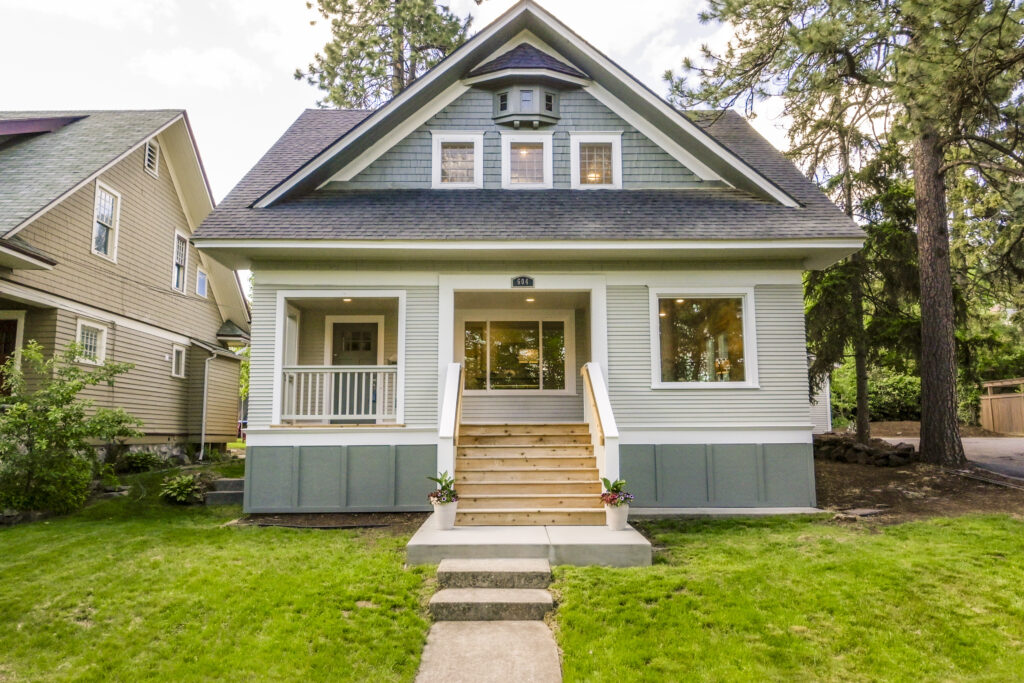Swimming pools are fun but they can also be dangerous. Accidents are always a possibility. It’s important to make sure you have proper homeowners insurance coverage. Doing so could save you thousands of dollars.
Insurers offer protection for physical damage to your pool as part of your homeowner’s insurance. But your policy will only pay for damages from covered perils. Carriers may also consider it as an “other structure” on your property. You’ll need to be sure that your policy includes coverage for it.
Your home insurance policy will protect you from any pool-related liabilities. If an accident occurs, you’re liable to pay for any damages. Meanwhile, your liability protection would step in to cover any accidents that occur, up to your current limits.
This article will define the basics of how your home insurance can cover your swimming pool, hot tub, or jacuzzi. We’ll tell you about how your homeowners policy protects both the physical structure and any liabilities. This includes teaching you about any extra protection you may need.
We’ll also lay out some best practices for pool management to help lower the risk of accidents and keep unwanted guests out.
Homeowners Covers Physical Damage to Your Pool
Your home insurance will cover any physical damage to the structure of your swimming pool if it’s part of your policy. Keep in mind that this is only when a covered peril causes damage. Perils are disasters that can threaten your house or any other structures on the property.
There are 16 perils that most homeowners insurers cover. Here are some of the most common:
- Fire
- Wind
- Hail
- Lightning strikes
- Vandalism
Other Structure Blanket Coverage
You may need to add other structure blanket coverage if you have a pool area. This is because it’s separate from your home. This applies whether it’s an in-ground or not. Some insurance companies will allow you to buy it. This lets you choose which structures you’d like to add to your policy. Be sure to check with your provider to see if you need it to cover yours.
Poor Maintenance Isn’t Covered
Your home insurance policy will cover quite a bit, but it doesn’t pay for any damages you cause. Damages because you didn’t maintain your pool aren’t a reason to file a claim. Insurers will only cut a check for damages that outside forces cause.
Homeowners insurance providers won’t cover any damages from ice. Draining the pool during the winter is a normal part of upkeep to prevent damage. Not doing so is a lack of maintenance and won’t be part of your policy.
Liability Protection Guards You from Accidents
Accidents can happen when you have a swimming pool. Per the Centers for Disease Control (CDC), there are an average of 3,960 unintentional drownings each year. It’s important to protect yourself from any liability. Otherwise, you could end up paying thousands in damages to the other people involved.
Your homeowners insurance will help protect you from many liabilities, including:
- Bodily injury
- Medical fees (e.g., x-rays, EMT costs, and hospital stays)
- Legal fees
So, if your neighbor trips and hurts themselves in or around your pool, you’re covered. Keep in mind that your insurer will only take care of damages up to your home insurance coverage limit. Any costs that are higher than your limit would require you to pay for them.
Unsupervised Accidents May Not Be Your Responsibility
Unfortunately, your pool or hot tub might attract unwanted guests. Let’s say you’re out of town and someone hops into it and injures themselves. You’ll likely not be on the hook to pay for any damages. But you could have to pay for their medical bills if you didn’t have any of the proper precautions in place. You may see insurers refer to this as being negligent. Later in the article is a guide on how to lessen accident risk with safety precautions.
Should You Have Extra Coverage for Your Pool?
If there’s an accident, your policy may not be able to cover all of the costs. This is because the expenses cost more than your limits. When you buy a swimming pool, you might think about increasing your homeowners limits. The Insurance Information Institute (III) recommends upping your limits to around $300,000 or $500,000, at minimum. But the best thing to do is to buy as much coverage as you can afford.
Another way to get more protection is to add an umbrella policy. Umbrella policies give you liability protection that extends beyond your limits. It can save you from expensive lawsuits or injuries that may go over your current limits.
Before you buy an umbrella policy, insurers usually want you to have a minimum amount of home insurance. Per the III, this number is about $300,000 worth of coverage. Be sure to check with your agent to make sure an umbrella policy is right for you.
Best Practices to Avoid Pool-Related Accidents
Owning a swimming pool carries a lot of responsibility with it. It’s up to you to make sure that it’s as safe as possible. There are many safety measures you can take to prevent injury or death. Some relate to the physical structure, while others are behavioral actions you can take.
Here are some best safety practices you can easily put in place:
- Build a fence or gate. Putting up a barrier can help prevent unwanted people from getting into the pool. It can also stop pets and small children from accidentally falling in. A barrier is usually a fence that encloses it.
- Teach your family members about pool safety. It’s critical to teach your family or other guests about safety, such as not running near the water. This can help avoid any unnecessary accidents. You may also consider putting your kids through swimming lessons.
- Create a list of pool rules. Post a rule list for anyone who uses your pool. Try to ensure that all guests follow these rules to the letter.
- Prepare for emergencies. Prep for any emergencies by keeping a first aid kid ready. Be sure to post emergency service numbers on a phone in your house.
- Leave instructions for how to operate the pool. Leave notes on how to shut off devices such as filters. Also, be sure that people know how to drain the water.
- Learn CPR. You may need to perform CPR if someone drowns. It’s a good idea to get a certification just in case.
The above can help you prevent accidents. But it’s also important to be responsible when you’re in or around the swimming pool area. Avoid excessive alcohol use near the water. Also, never leave children unattended. The worst can happen in the blink of an eye.
You should also make sure that all guests are comfortable with swimming and other water activities. If your guests can’t swim or you have any doubts about them, it’s best to not let them use the pool. The same goes for if they’re under the influence of drugs or alcohol.
Frequently Asked Questions
What if someone sneaks into my pool and gets hurt?
You likely won’t be liable for any injuries in this case. You didn’t know that they’d be there to begin with. So, you shouldn’t be responsible. But you could be liable if you didn’t take proper safety precautions beforehand. Be sure to follow best practices such as putting up a barrier around your pool and posting emergency info. You’d only be liable if you were negligent in some way. Try to avoid this as much as possible.
Does my homeowners policy require my pool to have a fence?
Your homeowners insurance provider will likely require your swimming pool to have a fence with a gate around it. Some states also require this. Even if nobody requires you to, it’s still a good idea to have it. Gates prevent unwanted people from getting into the water.
Fences also prevent small children from getting into the water without any supervision. A fence will lessen your chance of accidents. If you own a pool, you should check with your agent about whether or not you need a fence.
Does homeowners cover physical damage to my pool?
Your home insurance will cover physical damage. This is only if a covered peril causes damage to it. Any other damages will be up to you to pay for. Swimming pools usually fall under the “other structure” category. These are structures other than your house that are on your property.
You may need to buy other structure blanket coverage from your insurer. This helps you protect any extra structures on your property. This type of type of homeowners insurance allows you to pick which buildings you want to protect in your policy.
Keep in mind that your homeowners insurance won’t cover any repairs caused by the following:
- Wear and tear
- Poor maintenance
- Floods or earthquakes (these aren’t part of a regular homeowners policy)
- Freezing (it’s up to you to drain and winterize your pool)


